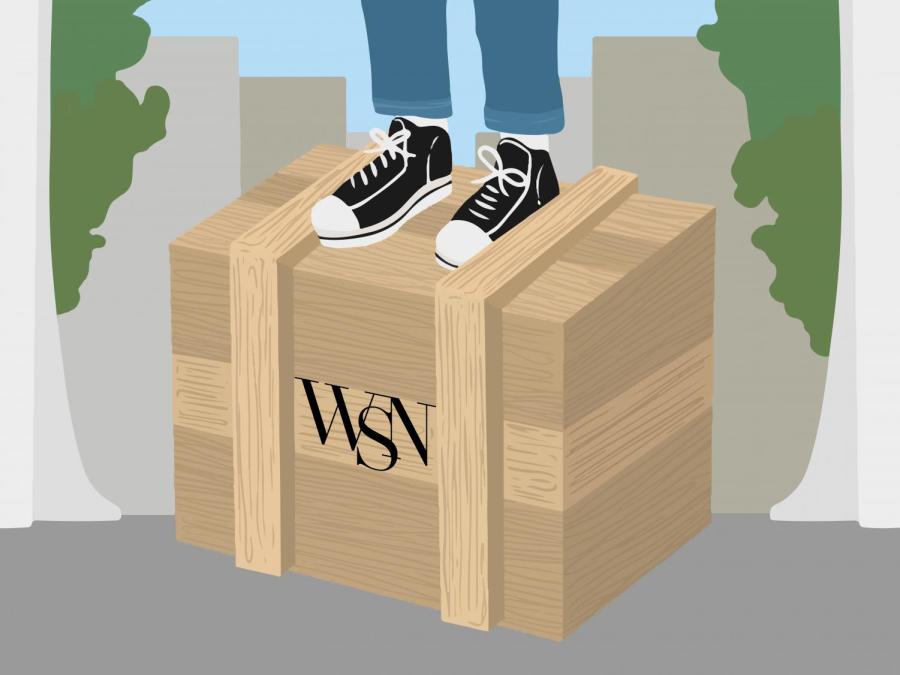The Soapbox: Afghan refugees uprooted, Australian banknotes, German mask mandate
The Soapbox is a weekly column by WSN’s news desk analyzing major developments in world news and rounding up the stories we think are worth the read this week. Global consciousness for a global university.
The Soapbox is a weekly news column rounding up stories worth reading for a global university. (Staff Illustration by Susan Behrends Valenzuela)
February 3, 2023
In London, the government uproots refugees
The British government has ordered the relocation of hundreds of Afghan refugees in London, giving 40 families one week to leave the capital and seek refuge in Wetherby, a town 200 miles away. Some of the refugees, including former members of the British army, are refusing the order.
Last year, the government initiated the Afghan Citizens Resettlement Scheme — also known as Operation Pitting — which intended to help resettle those who are at risk and vulnerable, as well as those who aided the British. The scheme hopes to resettle 20,000 Afghans in the coming years. The 9,000 Afghans who had been brought to London by the government under the scheme are the same refugees now being told they must leave.
Hamidullah Khan, a refugee and former British advisor, told The Guardian the government had broken its promise that it would help them find housing. His family is resisting relocating and is currently housed in the Kensington hotel. Khan requested that the government stop paying for hotel fees and instead aid them in renting a place of their own near London so that his three children don’t lose their schooling.
Peymana Assad, a local politician for the Labour Party, said to The Guardian that with many Afghans being kicked out of London, the number of applications for government housing assistance will increase and many refugees that are forced to move will have to rebuild their lives. However, the government claims that it has been telling the refugees for months that they would eventually have to move to Leeds.
“Occasionally families may be moved from a hotel scheduled for closure to another hotel,” a Home Office spokesperson told The Guardian. “In these instances, families are given appropriate notice of a move and are supported by their local authority. We are proud this country has provided homes for more than 7,500 Afghan evacuees, but there is a shortage of local housing accommodation for all.”
In Australia, the British monarch removed from banknotes
Australia announced on Feb. 2 that its central bank is officially removing the British monarch from its banknotes and replacing the image of King Charles III with an Indigenous design. The decision comes months after the death of Queen Elizabeth II last September. Australia had already removed images of the British monarch from most of its banknotes — before this decision was made, the Australian $5 bill was the only remaining one to feature the royal portrait.
While the British monarch remains Australia’s head of state, the nation is deliberating the extent to which that constitutional tie should remain. Australia’s Reserve Bank said this decision was made to honor “the culture and history of the First Australians” and that the other side of the banknote will continue to represent the Australian parliament.
In a statement, the bank said it will consult Australia’s Indigenous population during the design process for the new $5 note. Until then, the current banknote will remain in use.
Despite the proposed changes to banknotes, the king is expected to continue to appear on Australian coins — which currently feature the late Elizabeth. British currency began transitioning to new coins featuring Charles in December, while Australia is expected to make the same change later this year.
In Germany, mask mandate lifted for public transit
Germany is no longer requiring bus, tram and train passengers to wear masks as of Thursday, Feb. 2. Obligatory mask-wearing on public transit had been due to remain in force until April, but the federal cabinet decided to lift the mandate following a nationwide decrease in COVID-19 cases.
Berlin announced the end of its mask mandate on Jan. 13 after facing increased pressure from other European countries, many of which have already lifted mandates for public transportation. German health minister Karl Lauterbach, however, is still recommending people wear masks voluntarily and is requiring that people keep wearing FFP2 masks — the equivalent of American N95s — when visiting hospitals, care homes and doctor’s offices until Apr. 7.
Some of Germany’s 16 federal state governments, in addition to dropping their mask mandates, have also lifted rules requiring infected individuals to isolate. Bijan Djir-Sarai, the general secretary of Germany’s Free Democratic Party, told DW that the mask regulation would not have been lifted if not for the party’s pressure on the government which had claimed that “Germany has overcome the pandemic.
Maintaining the mask mandate has been increasingly difficult in Germany due to passenger retaliation at being forced to wear one. Assaults against transportation employees increased between 2021 and 2022, which the national railway company attributed to the mask mandate.
Contact Yezen Saadah at [email protected].

























































































































































